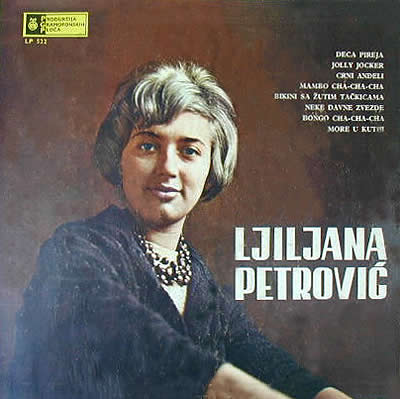Bajaga i Instruktori were formed in 1984 by Momčilo Bajagić, the guitarist of the highly popular hard rock band Riblja Čorba from 1978 to 1984. At the time, Bajagić decided to release a solo album composed of songs he had originally written for Riblja Čorba, entitled Pozitivna geografija (Positive geography). Bajagić did not intend to leave Riblja Čorba, but events unfolded in that direction, and by April 12, 1984, Bajaga i Instruktori, Bajagić's backing band with whom he had recorded the album, played their first concert as a group, in Zagreb. The album went on to become a hit, with songs such as "Berlin", "Mali slonovi" ("Little elephants"), "Poljubi me" ("Kiss me"), "Limene trube" ("Brass trumpets") and "Tamara". After the album release, the group started preparing their second studio album intended to be released during the following year.
Following the release of Sa druge strane jastuka (On the other side of the pillow) in 1985, the band rose to mega-fame that year, and virtually every song on the album became an instant hit. The group received a song-of-the-year award for the hit "Zažmuri" ("Close your eyes"), and the album also featured the hits "220 u voltima" ("220 volts"), "Ti se ljubiš" ("You're kissing"), "Dvadeseti vek" ("20th century"), "Dobro jutro, džezeri" ("Good morning, jazz players"), "Vidi šta sam ti uradio od pesme, mama", a cover version of Melanie Safka's "What Have They Done To My Song, Ma?", "Francuska ljubavna revolucija" ("French love revolution") and the popular title track "Sa druge strane jastuka".
Bajaga i Instruktori moved in a slightly different direction with the release of their third album Jahači magle (Fog riders) released in 1987, featuring further experimentation with musical genres. Again, virtually every song on the album was an instant hit, including "300 na sat" ("300 per hour"), "Samo nam je ljubav potrebna" ("All we need is love"), "442 do Beograda" ("442 to Belgrade") and rock-jazz fusion, "Red i mir" ("Law and order"). As on the previous record, Bajaga and Dejan Cukić shared vocal duties, particularly apparent in the hit song "Bam, bam, bam". After the album release, Cukić left the band, starting a solo career and soon forming his own backing Spori Ritam Band.
Without Cukić, Bajaga i Instruktori released a new album entitled Prodavnica tajni (Shop of secrets) in 1988, inspired partially by their tour of the Soviet Union, featuring a more melancholic mood than on the previous three albums. The album featured several hit songs, including the folk-sounding "Plavi safir" ("Blue sapphire") , "Gore-dole" ("Up-down"), "Verujem, ne verujem" ("I believe, I don't believe"), "Ruski voz" ("Russian train"), "Tišina" ("Silence"), "Godine prolaze" ("Years are passing") and "Život je nekad siv, nekad žut" ("Live is sometimes gray, sometimes yellow"). The following year, the band released Neka svemir čuje nemir (May the universe hear the disturbance), a compilation of new songs and live recordings, including the album title track and the pop number "Na vrhovima prstiju" which became nationwide hits.
BAJAGA in some interview from 1988, transmission was called "Black and white wordl", held in Studio B, Belgrade, YUGOSLAVIA GOOD OLD LINK FOR THIS RARITY
Following the release of Sa druge strane jastuka (On the other side of the pillow) in 1985, the band rose to mega-fame that year, and virtually every song on the album became an instant hit. The group received a song-of-the-year award for the hit "Zažmuri" ("Close your eyes"), and the album also featured the hits "220 u voltima" ("220 volts"), "Ti se ljubiš" ("You're kissing"), "Dvadeseti vek" ("20th century"), "Dobro jutro, džezeri" ("Good morning, jazz players"), "Vidi šta sam ti uradio od pesme, mama", a cover version of Melanie Safka's "What Have They Done To My Song, Ma?", "Francuska ljubavna revolucija" ("French love revolution") and the popular title track "Sa druge strane jastuka".
Bajaga i Instruktori moved in a slightly different direction with the release of their third album Jahači magle (Fog riders) released in 1987, featuring further experimentation with musical genres. Again, virtually every song on the album was an instant hit, including "300 na sat" ("300 per hour"), "Samo nam je ljubav potrebna" ("All we need is love"), "442 do Beograda" ("442 to Belgrade") and rock-jazz fusion, "Red i mir" ("Law and order"). As on the previous record, Bajaga and Dejan Cukić shared vocal duties, particularly apparent in the hit song "Bam, bam, bam". After the album release, Cukić left the band, starting a solo career and soon forming his own backing Spori Ritam Band.
Without Cukić, Bajaga i Instruktori released a new album entitled Prodavnica tajni (Shop of secrets) in 1988, inspired partially by their tour of the Soviet Union, featuring a more melancholic mood than on the previous three albums. The album featured several hit songs, including the folk-sounding "Plavi safir" ("Blue sapphire") , "Gore-dole" ("Up-down"), "Verujem, ne verujem" ("I believe, I don't believe"), "Ruski voz" ("Russian train"), "Tišina" ("Silence"), "Godine prolaze" ("Years are passing") and "Život je nekad siv, nekad žut" ("Live is sometimes gray, sometimes yellow"). The following year, the band released Neka svemir čuje nemir (May the universe hear the disturbance), a compilation of new songs and live recordings, including the album title track and the pop number "Na vrhovima prstiju" which became nationwide hits.
BAJAGA in some interview from 1988, transmission was called "Black and white wordl", held in Studio B, Belgrade, YUGOSLAVIA GOOD OLD LINK FOR THIS RARITY













No comments:
Post a Comment